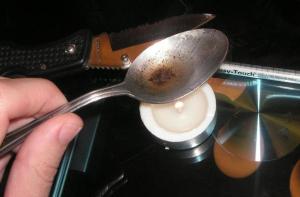Here's a twitchy, harrowing look at Colombia's cocaine industry.
The House has approved allowing members of the military to use hemp and CBD products, an Idaho medical marijuana initiative campaign is threatening to sue the state over signature-gathering, and more.
A pair of Chicago cops are headed to prison for their misdeeds, and a trio of prison guards break bad.
The Idaho Cannabis Coalition threatens to sue if state officials don't allow it to use electronic signature-gathering in the midst of the pandemic, a drug testing lab reports spikes in the use of four illicit drugs during the pandemic, and more.
After the first decline in drug ODs in decades in 2018, the number jumped again last year, the CDC says; Canadian psychotherapists want the ability to use psilocybin themselves to better treat patients using the drug, and more.
A first congressional challenge to the Washington, DC, natural psychedelics initiative has been fended off, Mexico's toll of "disappeared" in drug violence in the past 14 years tops 70,000, and more.
California marijuana felonies are at the lowest level since 1954, Argentina moves to make its medical marijuana program more patient-friendly, and more.
New Approach Montana says county-level data shows it has qualified a marijuana legalization initiative for the November ballot but the results aren't official yet, Canada's health minister says she's open to discussing drug decriminalization, and more.
The city of Chicago will pay out big time for seizing the vehicles of people in small-time drug busts, a California bill would undo some drug war sentencing excesses, the Colombian opposition has filed a bill to decriminalize and regulate cocaine, and more.
The organized opposition makes a move in Arizona, a Pennsylvania lawmaker is trying to jumpstart a stalled marijuana legalization bill, and more.
Kilo: Inside the Deadliest Cocaine Cartels -- From the Jungle to the Streets, by Toby Muse (2020, William Morrow, 303 pp., $28.99 HB)
For the last 40 years, Colombia has been one of the world's leading coca and cocaine producers, vying with Peru and Bolivia for the title each year, and recently consistently coming out on top as the world's largest producer. This despite billions of dollars spent by the Colombian government and the United States to try to eradicate the crop and suppress the trade.
It's also -- and not coincidentally -- been one of the most violent countries on the planet. A decades-long civil war between the leftist militants of the FARC and the Colombian state left hundreds of thousands dead and millions displaced. And after coca and cocaine took hold beginning in the 1980s, that civil war morphed into a vicious, multi-sided conflict featuring not only more leftist guerillas of various stripes and Colombian military and police forces aided and abetted by the US, but also various rightist paramilitary forces controlled by drug lords and conservative wealthy landowners working in collusion with security forces.
With Kilo, Bogotá-based journalist Toby Muse dives deep inside Colombia's coca and cocaine trade to provide unparalleled reporting both on the industry and on the dance of death it provokes again and again and again. He starts at the beginning: in the coca fields of a Catatumbo province, near the Venezuelan border. There, refugees from the economic implosion across the line now form the majority of raspachines, the farm hands whose job it is to strip the bushy plants of their coca-laden leaves. At the end of each harvest day, they tote large bags filled with the day's haul to the farm scale to be weighed and paid. They might get $8 a day.
In simple labs -- a wooden shack or maybe four poles and a tarp -- that dot the jungly countryside -- those humble leaves are pulverized and steeped in a chemical brew to create coca paste, one step away from the white powder, cocaine hydrochloride. A ton of leaves is transformed into a kilo and a half of paste, which the farmer can sell for about $400. That used to be good money, but the price has held steady for 20 years, there's more coca than ever, and costs have gone up.
But while the introduction of coca as a cash crop initially brought boom times, the smell of all the cash being generated inevitably attracted the attention of the armed groups, those strange hybrid revolutionary drug traffickers and rightist narco-militias. And that meant fighting and disappearances and massacres as the men with the guns fought to control the lucrative trade. Where coca comes, death follows, Muse writes.
Muse follows the kilo, now processed into cocaine, to the local market town, a Wild West sort of place where traffickers meet farmers, farmers get paid, and the local prostitutes -- again, now mostly Venezuelan -- get lots of business. He interviews all sorts of people involved in the trade or affected by it, from the $12 an hour sex workers to the drunken, just paid farmers and raspachines and the business hustlers who flock to the town to peddle flat screen TVs and the urban traffickers who come out to the sticks to pick up their cocaine.
And then it's on to Medellin, famed as the home of OG drug lord Pablo Escobar, and now a bustling, modern metropolis where cocaine still fuels the economy but where the drug barons are no longer flashy rural rubes but quiet men in suits, "the Invisibles," as they're now known. They may be lower profile, but they're still ruthless killers who hire poor, ambitious local kids, known as sicarios, to do the actual killing. Muse wins the confidence of a mid-level trafficker, a former policeman who learned the trade from the other side and now applies his knowledge to run an international cocaine network.
And he parties with the narcos at Medellin night clubs, techno music blasting, guests wasted on whiskey and cocaine and 2-CB ("pink cocaine," like cocaine with a psychedelic tinge, an elite party drug that costs $30 a gram while cocaine goes for $3). This glamorous life is what it's all about, what makes the constant fear or death or imprisonment worth it:
"The clubs feel like the center of this business of dreams. Cocaine has all the nervous energy of a casino where everyone keeps winning money, sex is everywhere, and at any moment, someone might step up and put a bullet in your head. This is the deal in cocaine and people are happy to take it."
Nobody expects to last too long in the trade, but they live the high life while they can. Muse's drug trafficker, Alex, doesn't make it to the end of the book, gunned down by somebody else's sicario. But before he is killed, that titular kilo makes its way out of the country and into the eager noses of London or Los Angeles.
Muse's descriptions of life in the cocaine business are vivid and detailed; his atmospherics evoke the tension of lives outside the law, where no one is to be trusted, and brutal death can come in an instant. A young sicario whom he interviews over a period of months, ages before our eyes, killing for his bosses, afraid of being killed in turn, and numbing himself in between hits with whiskey and cocaine. He wants out, but there looks to be no exit.
As a good journalist, Muse also interviews the drug law enforcers, the cops who bust mules at the Bogotá airport, the drug dog handlers running the aisles of massive export warehouses, the naval officers who hunt down the narco-subs. And it is only here, where the futility of their Sisyphean task is evident, that any critique of drug prohibition is articulated:
"">No one knows how widespread corruption is in the airports and ports. Police officers admit it's a huge problem, but only in private, off the record. That's the hypocrisy of the drug war. In formal interviews, officers point out how well they're doing, the positive results. And as soon as the interview is over, and the recorder stops, they sit back and tell you what's really happening. They tell you of the constant problem of corruption, how the war is unwinnable, and how the only solution is legalization. In private, to state that the war on cocaine can be won would make you look like an idiot. To admit the war is unwinnable in public is to end a career."
That's as close as Muse gets to any policy prescriptions. Still, Kilo digs as deep into the trade as anyone ever has, and he has the journalistic chops to make a bracing, informative, and very disturbing read. This may be as close to the Colombian cocaine business as you want to get.
back to top
The House has approved allowing members of the military to use hemp and CBD products, an Idaho medical marijuana initiative campaign is threatening to sue the state over signature-gathering, and more.
NationalHouse Approves Hemp, CBD Use for Military Members. The House Monday approved an amendment to the National Defense Authorization Act by Rep. Tulsi Gabbard (D-HI) that would allow service members to use hemp and CBD products. "The Secretary of Defense may not prohibit, on the basis of a product containing hemp or any ingredient derived from hemp, the possession, use, or consumption of such product by a member of the Armed Forces," the amendment says. The bill now must be approved by the Senate.
Arkansas
Arkansas Medical Marijuana Growers Sue to Keep Out Competition. Five companies with medical marijuana cultivation permits are suing to stop three more cultivation licenses from being issued. The growers argue that the new licenses issued in June violated state law because the law requires they only be issued if the original permit holders couldn't meet patient demand.
Florida
Florida Supreme Court Asks for Rare Second Round of Arguments in Medical Marijuana Case. In a rare move, the state's high court last Tuesday ordered a second round of arguments in a battle about whether the state has properly carried out a 2016 constitutional amendment that broadly legalized medical marijuana. The case is a lawsuit filed by Florigrown, a Tampa company that has questioned whether a 2017 law passed to implement the voter-approved constitutional amendment is itself constitutional. The case centers on parts of the law around licensing companies to operate in the industry.
Idaho
Idaho Medical Marijuana Initiative Campaign Threatens to Sue Over State's Refusal to Allow Electronic Signature-Gathering. The Idaho Cannabis Coalition, the people behind a medical marijuana initiative, is now threatening to sue state officials if they continue to block activists from collecting signatures electronically. The move comes after a federal court ruled that an unrelated initiative campaign could move ahead with electronic signature-gathering. The medical marijuana campaign sent a letter to state officials Monday saying that while it "has no interest in litigation," it will sue if the state does not respond to its request by Thursday.
back to top
A pair of Chicago cops are headed to prison for their misdeeds, and a trio of prison guards break bad. Let's get to it:
In Henning, Tennessee,
a state prison guard was arrested last Sunday for trying to smuggle drugs into the West Tennessee State Penitentiary. Officer Trayvon Lee went down after he arrived at work smelling of marijuana. A subsequent search of his vehicle uncovered 13 ounces of marijuana and ten ounces of tobacco wrapped up in packages in the trunk of the car. He is now charged with introduction of contraband into a penal facility and possession of schedule VI drugs. And he was fired.
In St. Gabriel, Louisiana, a cadet corrections officer was arrested last Monday on charges she tried to smuggle contraband into the Elayn Hunt Correctional Center. Paige Destiny Ruiz, 21, went down after prison officials staked out the prison to watch her try to make a drop and found her carrying a paper bag with six cell phones, 45 pieces of loose-leaf paper sprayed with a substance suspected to be synthetic cannabinoid enclosed in clear bags, a four-ounce clear bottle of a liquid substance suspected of being cough syrup with codeine, 250 pills suspected to be MDMA (ecstasy), three packs of tobacco, 42 Nugenix Total-T testosterone pills, five taped bundles of suspected illicit substances containing 200 grams, and 26 cell phone manuals with activation packages. She also had two cigars in her front pants pocket. She is facing eight counts of introduction of contraband into a penal institution, malfeasance in office, possession with intent to distribute MDMA, possession with intent to distribute marijuana, possession with intent to distribute synthetic cannabinoids, and possession of a firearm while in possession of a controlled substance. She had been on the job less than two months.
In Spokane, Washington, a guard at the Airway Heights Corrections Center was arrested Monday after being caught bringing 15 grams of meth into the prison. Michael Mattern, 45, a 20-year veteran guard was also carrying heroin and suboxone in his lunch box. Mattern went down after inmates ratted him out, and the prison's internal investigations "led to evidence that Mattern has been compromised as a corrections officer and is introducing controlled substances into AHCC's secure facility in exchange for money, drugs and sex." He faces federal drug distribution charges.
In Chicago, a Chicago police officer was sentenced last Wednesday to nearly six years in federal prison for using bogus search warrants to raid homes and steal cash and drugs. Officer David Salgado will now join behind bars his former partner, Sgt. Xavier Elizondo, who was sentenced last month to seven years and three months in the same scheme. Both men were guilty in October of conspiracy and obstruction of justice charges. Elizondo was also convicted on one count of attempting to destroy evidence, while Salgado was also found guilty of one count of lying to the FBI. The pair used fake informants to provide false information to judges to get search warrants signed. Their lawless rampage lasted from June 2017 to July 2018 while they were working on a gang crime squad.
back to top
The Idaho Cannabis Coalition threatens to sue if state officials don't allow it to use electronic signature-gathering in the midst of the pandemic, a drug testing lab reports spikes in the use of four illicit drugs during the pandemic, and more.

Colombian coca grower (DEA)
Idaho Medical Marijuana Initiative Campaign Threatens to Sue Over State's Refusal to Allow Electronic Signature-Gathering. The Idaho Cannabis Coalition, the people behind a medical marijuana initiative, is now threatening to sue state officials if they continue to block activists from collecting signatures electronically. The move comes after a federal court ruled that an unrelated initiative campaign could move ahead with electronic signature-gathering. The medical marijuana campaign sent a letter to state officials Monday saying that while it "has no interest in litigation," it will sue if the state does not respond to its request by Thursday.
Drug Use
Positive Test Rates for Four Illicit Drugs Spike During Pandemic. A report published by the specialty laboratory Millennium Health analyzed more than half a million urine drug test results and found large increases in the use of four illicit drugs during the coronavirus pandemic. The lab found a 32.0% increase for non-prescribed fentanyl over the same period last year, a 20.0% increase for methamphetamine, a 10.1% increase for cocaine, and a 12.5% increase for heroin.
International
Colombian Defense Minister Says Aerial Fumigation of Coca Crops to Start Up Again. Colombian Defense Minister Carlos Holmes Trujillo said Tuesday that the government is advancing plans to restart aerial fumigation of coca crops in accordance with guidelines set out by the country's high court. "We are advancing, we have taken all the steps demanded by the Constitutional Court and we are meeting the requirements of the authorities," he said. "Restarting the spraying program is fundamental. It is in the best interest of the country and it will allow us to continue making progress much more effectively in the fight against the world drug problem," he added, without giving an exact date to restart aerial spraying." Spraying was halted in 2015 over environmental and public health concerns linked the chemical used, glyphosate, to cancer. The Trump administration is pushing Colombia to restart as well.
back to top
After the first decline in drug ODs in decades in 2018, the number jumped again last year, the CDC says; Canadian psychotherapists want the ability to use psilocybin themselves to better treat patients using the drug, and more.

Drug overdose deaths were up last year, according to preliminary data from the CDC. (Creative Commons)
Florida Supreme Court Asks for Rare Second Round of Arguments in Medical Marijuana Case. In a rare move, the state's high court Tuesday ordered a second round of arguments in a battle about whether the state has properly carried out a 2016 constitutional amendment that broadly legalized medical marijuana. The case is a lawsuit filed by Florigrown, a Tampa company that has questioned whether a 2017 law passed to implement the voter-approved constitutional amendment is itself constitutional. The case centers on parts of the law around licensing companies to operate in the industry.
Drug Use
CDC Preliminary Data Shows Increase in Overdoses Last Year. After declining for the first time in decades in 2018, drug overdose deaths rose 4.6% in 2019, according to preliminary data from the Centers on Disease Control and Prevention (CDC). According to the data, which won't be finalized until year's end, there were 70,980 overdose deaths last year, up from 67,850 in 2018. Experts fear drug deaths will be even higher this year during a global pandemic that has disrupted health care and drug markets, isolated millions of people, and left millions more jobless.
International
Canadian Psychotherapists Petition Government for Permission to Dose Themselves to Better Treat Patients. A nonprofit group of psychedelic therapists, TheraPsil, is asking Health Canada for permission to be able to dose themselves with psilocybin in a bid to better help their patients. The move comes as a group of terminally ill patients awaits permission from the ministry to use magic mushrooms for end of life care. The group says therapists need firsthand experiences with the drug's effects: "The fundamental reason to expose therapists to their own experiences with psychedelics is that, unless you have visited these realms, you are unlikely to understand their importance." Going to a psychedelic therapist who hasn't used psychedelics would be like "going to a sex therapist who's never had sex before," said the group's executive director, Spencer Hawkswell.
back to top
A first congressional challenge to the Washington, DC, natural psychedelics initiative has been fended off, Mexico's toll of "disappeared" in drug violence in the past 14 years tops 70,000, and more.

ayahuasca-inspired art (CC)
House Committee Takes Up DC Natural Psychedelics Initiative. The House Appropriations Committee, which has jurisdiction over affairs in Washington, DC, held a hearing Wednesday to debate the status of magic mushrooms in the nation's capital, as an initiative that would make natural psychedelics the lowest law enforcement priority appears set to make the November ballot. The day saw an amendment by Rep. Andy Harris (R-MD), a longtime foe of DC drug reform efforts, which would bar the use of natural psychedelics without a doctor's recommendation, but Harris then withdrew the amendment in the face of Democratic opposition. "If the district's residents want to make mushrooms a lower priority and focus limited law enforcement resources on other issues, that is their prerogative," said Rep. Mike Quigley (D-IL).
International
Colombia Drug Gangs, Armed Groups Are Killing Pandemic Lockdown Violators, Human Rights Watch Says. Armed groups tied to drug trafficking organizations have enforced their own lockdown orders and killed people who didn't comply, according to a new report from Human Rights Watch. The group has documented at least nine killings for breaking social distancing orders since April, as well as documented examples of armed groups threatening and attacking people who breaks the groups' lockdown rules. "In communities across Colombia, armed groups have violently enforced their own measures to prevent the spread of Covid-19," José Miguel Vivanco, Americas director at Human Rights Watch, said in the report released Wednesday. "This abusive social control reflects the government's long-standing failure to establish a meaningful state presence in remote areas of the country, including to protect at-risk populations."
Mexico's Toll of Disappeared Rises Again. The number of people who have been "disappeared" in the prohibition-related violence ripping through Mexico has officially risen to 73,201, up from 61,000 in January. The vast majority of the disappearances have come since 2006, when the contemporary Mexican "war on drugs" began. In that same period, authorities have unearthed nearly 4,000 clandestine graves, with 6,625 bodies recovered.
back to top
California marijuana felonies are at the lowest level since 1954, Argentina moves to make its medical marijuana program more patient-friendly, and more.

Black and Hispanic Californians are still more likely to be arrested for marijuana than whites. (Creative Commons)
California Felony Marijuana Arrests Decline After Legalization, But Racial Disparities Persist. Felony marijuana arrests continued to decline in the wake of legalization, dropping from 1,617 in 2018, the first year of broad legalization, to 1,181 last year, a decline of 27%. But minorities remained subject to disproportionate arrests, with Hispanics accounting for 42%, Blacks for 22%, and whites at 21%. The percentage of Black and Hispanic arrests "is troubling, especially now that we've legalized it," said Ellen Komp, deputy director of the California arm of the National Organization for the Reform of Marijuana Laws. "It's legal if you have the venture capital to open up on Main Street." The number of felony arrests last year marked the lowest figure since 1954, NORML said.
Medical Marijuana
Arkansas Medical Marijuana Growers Sue to Keep Out Competition. Five companies with medical marijuana cultivation permits are suing to stop three more cultivation licenses from being issued. The growers argue that the new licenses issued in June violated state law because the law requires they only be issued if the original permit holders couldn't meet patient demand.
International
Argentina to Allow Home Cultivation, Pharmacy Sales for Medical Marijuana. The Health Ministry on Wednesday met with stakeholders Wednesday to finalize details on draft regulations for medical marijuana cultivation and sales. The draft regs will allow for home cultivation by patients and the sale of oils and topicals by local pharmacies. The regs also guarantee access to medical marijuana for all patients free of charge. The new regulations are aimed at addressing deficiencies in the country's 2017 law that legalized medical marijuana, but failed to adequately cover patient needs.
back to top
New Approach Montana says county-level data shows it has qualified a marijuana legalization initiative for the November ballot but the results aren't official yet, Canada's health minister says she's open to discussing drug decriminalization, and more.

The Jalisco New Generation Cartel released this video of a massive armed convoy last Friday. (screen grab)
Montana Activists Say County Figures Show They Qualified for Ballot. New Approach Montana, the group behind the I-190 marijuana legalization initiative and the C-118 constitutional amendment to set the legal age for marijuana at 21, said last Friday that official county-level data shows they collected enough valid voter signatures to qualify for the November ballot. The claim is based on county-level signature verification data, as well as the campaign's own verification process. The group said it had 8,000 more valid signatures than the 25,000 required for the initiative and nearly 2,000 more valid signatures than the 51,000 required for the constitutional amendment.
Drug Policy
Third Party Presidential Candidates Embrace Marijuana Legalization, Drug Decriminalization. Both the Libertarian and Green Party presidential nominees are supporting bold drug policy proposals, including marijuana legalization. Neither Democratic nominee Joe Biden nor incumbent Republican Donald Trump have embraced marijuana legalization. Libertarian pick Jo Jorgensen and Green Party nominee Howie Hawkins both back legalizing marijuana for adult use and more broadly ending the criminalization of other currently illicit substances. "We've got to treat drug abuse as a health problem. You should legalize marijuana and decriminalize the hard drugs like Portugal," Hawkins said. "Instead of just throwing people in prison and building the biggest prison industrial system in the world -- which Joe Biden had a lot to do [with], he wrote the legislative architecture for that as chair of the Senate Judiciary Committee -- we should be treating drug addiction as a health problem, not a criminal problem."
International
Canada Health Minister Open to Examining Drug Decriminalization. In response to a request from the Canadian Association of Chiefs of Police, Health Minister Patty Hadju said she was open to having discussions about drug decriminalization. "To find out how we would do that in the best possible way. I'm excited to explore all possibilities to reduce the criminalization of people who use substances," she said. "You know having been a person who worked in drug policy for a long time, I can tell you when you have the support of enforcement to take the next steps or affirm what you are doing, I think that's very important," Hajdu said.
Mexico Puts Army in Charge of Customs to Fight Drug Trade. President Andres Manuel Lopez Obrador has announced that he is placing the Army in charge of Customs at land borders and seaports in a bid to stamp out large-scale corruption linked to the illicit drug trade. "We've taken this decision due to the poor administration of the seaports, with corruption and drug smuggling in these ports," he said. The move does not include the country's airports. Mexican seaports are entry points for precursor chemicals for heroin and methamphetamine manufacture.
Mexican Cartel Shows Off Its Firepower. In what is being described by analysts as a message to the Mexican government, the Jalisco New Generation Cartel (CJNG) released a video last Friday showing heavily-armed cartel members alongside a long, long convoy of armored vehicles. The video shows about 75 gunmen wearing military-style fatigues and at least 20 armored vehicles, some emblazoned with CJNG initials and "special forces" or "elite group." The video release came as President Andres Manuel Lopez Obrador was visiting Jalisco state.
(This article was prepared by StoptheDrugWar.org's 501(c)(4) lobbying nonprofit, the Drug Reform Coordination Network, which also pays the cost of maintaining this website. DRCNet Foundation takes no positions on candidates for public office, in compliance with section 501(c)(3) of the Internal Revenue Code and does not pay for reporting that could be interpreted or misinterpreted as doing so.)
back to top
The city of Chicago will pay out big time for seizing the vehicles of people in small-time drug busts, a California bill would undo some drug war sentencing excesses, the Colombian opposition has filed a bill to decriminalize and regulate cocaine, and more.

Cocaine could be decriminalized and regulated under a bill being considered in Colombia. (Pixabay)
Arizona Poll Shows Strong Support for Marijuana Legalization. A new poll has support for marijuana legalization at 62%. The poll comes as backers of the Smart and Safe Arizona Act legalization initiative awaits confirmation from state officials that it has submitted a sufficient number of valid voter signatures to qualify for the November ballot.
Asset Forfeiture
Chicago to Pay $5 Million to Settle Class Action Suit Over Vehicles Seized in Drug Busts. A city council committee on Monday approved a $5 million payout to settle a class action lawsuit filed by two people whose vehicle was seized after a passenger was arrested for marijuana possession. The settlement will apply to hundreds of other cases where drivers had their vehicles impounded as part of drug cases. The settlement will pay people whose cars were seized the estimated Kelly Blue Book value of the vehicle.
Sentencing
California Bill Would End Mandatory Jail and Prison Sentences for Drug Offenses. State Sen. Scott Weiner (D-San Francisco) has filed SB 378, which would repeal 1980s drug war laws that enacted mandatory minimum sentences for drug offenses. Under current law, judges are denied the discretion to sentence drug offenders to probation or diversion. "For a lot of people in progressive California it is surprising to hear that in 2020, with all of the reforms that we've been working on for years, that there are still mandatory jail or prison sentences for non-violent drug offenses," Wiener explained. "But here we are in California, in 2020, with mandatory prison or jail sentences for nonviolent drug sentences," he said.
International
British Columbia Premier Asks Canadian Federal Government to Decriminalize Drugs. BC Premier John Horgan sent a letter Monday to Prime Minister Justin Trudeau asking him to have the federal government decriminalize drug possession. Such a move would "reduce the systemic stigma associated with illicit drug use and support people to access the services that they need," he said. "Criminal prohibitions are ineffective in deterring drug use, and criminalization of drug possession directly leads to both individuals and systemic stigma and discrimination that prevent people from seeking services," he added.
Colombia Opposition Files Cocaine Decriminalization Bill. A pair of opposition senators have filed a bill to decriminalize cocaine and regulate its production. The bill is part of a broader package to end the war on drugs that was filed last year by the leftist and centrist opposition blocs. The bill seeks strict state control over coca cultivation and cocaine production in a bid to cut the finances of drug trafficking organizations and armed groups.
back to top
The organized opposition makes a move in Arizona, a Pennsylvania lawmaker is trying to jumpstart a stalled marijuana legalization bill, and more.
Marijuana PolicyArizona Pot Legalization Foes File Lawsuit to Block Initiative. Opponents of the Smart and Safe Arizona Act marijuana legalization initiative have filed a lawsuit aimed at keeping the measure off the November ballot. The lawsuit, by Arizonans for Health and Public Safety, argues that the initiative's backers did not accurately describe the measure in a 100-word summary included on petitions that voters signed for it to qualify for the general election. The initiative campaign says the lawsuit is without merit, and the state Supreme Court ruled in 2018 that the 100-word summaries do not need to detail every provision of a ballot measure. The initiative has already handed in signatures and is awaiting verification from state officials that it has qualified for the ballot.
Pennsylvania Lawmaker Renews Push to Legalize Recreational Marijuana. State Sen. Sharif Street (D-Philadelphia) is trying to jumpstart a marijuana legalization bill, SB 350, that has been stalled in committee since last fall. He authored a letter to Senate and Republican leadership earlier this month to try to prod them, and more than a dozen other senators, all Democrats, signed it. Street says the state needs the revenues from marijuana legalization in the wake of the fiscal impact of the coronavirus crisis.
Hemp
House Approves Hemp, CBD Use for Military Members. The House Monday approved an amendment to the National Defense Authorization Act by Rep. Tulsi Gabbard (D-HI) that would allow service members to use hemp and CBD products. "The Secretary of Defense may not prohibit, on the basis of a product containing hemp or any ingredient derived from hemp, the possession, use, or consumption of such product by a member of the Armed Forces," the amendment says. The bill now must be approved by the Senate.
back to top








